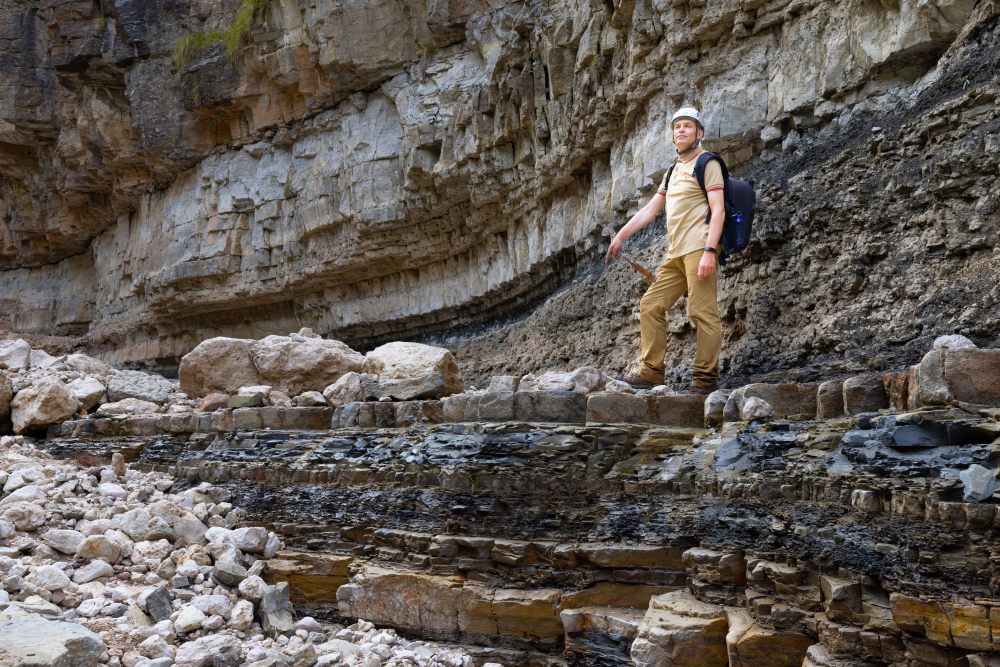Asteroid strikes, colliding continents, seismic eruptions, and the arrival of a devastating species – Earth’s had a lot to deal with in its day. These events do, however, make for great television, and you can get swept up in some of the most epic and destructive events in our planet’s history in a new five-part series from the BBC and wildlife TV presenter and conservationist Chris Packham called Earth.
Earth’s history is divided into eras, periods, epochs, and ages, with some suggesting we are now entering the Anthropocene. The planet’s in rough shape today, and while we might be seeing its hottest temperatures on record, it doesn’t quite compare to catastrophic events of the past. When it comes to the worst day on Earth for the planet, this was probably around the time of the Permian Extinction.
“I think that most people perceive that the worst moment is the extinction of the dinosaurs. It’s the most recent significant extinction event that we’ve had, and it’s become famous because of the amount of attention that we give dinosaurs,” Chris Packham told IFLScience. “But then the Permian Extinction accounted for a higher percentage of species lost over the entire planet.”
Also known as the Great Dying, the Permian Extinction wiped out around 96 percent of marine species and 70 percent of terrestrial species on Earth. It was a devastating time for biodiversity – but as Earth counters, not all extinction is bad, as it’s also a vital step in the evolution of new life.
In fact, what you discover as you watch plumes of toxic gases spew from the crevices of volcanic rock is that Earth – and the life growing on it – has an unparalleled ability to bounce back. Even when the landscape becomes a literal hellscape.
The Great Dying was marked by the Siberian Traps eruption that lasted for two million years, creating enough lava to cover an area the size of Australia. Animals in the immediate vicinity would’ve died as a direct result, but the geological record of this time shows that life was dying everywhere – the remains of which can be seen today in a “line of death” preserved in rock, something Packham visits in episode one, Inferno, at the Sciliar-Catinaccio Nature Park in South Tyrol, Italy (pictured below).

Chris Packham visits the “line of death” in Italy.
Image credit: BBC Studios/BBC
As global temperatures rose as much as 10°C (18°F) because of the eruption, it’s thought toxic halogens destroyed the Earth’s ozone layer, making it virtually uninhabitable. And yet, what little life did remain endured to see in the age of the dinosaurs.
“I think one of the enduring themes of our series is the tenacity of life,” Packham continued. “It’s either being seemingly – if you anthropomorphize – incredibly patient because it’s waiting for a change so that it can find opportunities to prosper, or it’s recovering from a significant change in conditions.”
As the series traces some of the greatest eruptions, freezes, and moments of sheer destruction in Earth’s history, it’s a reminder that the planet is more indifferent to us than we care to admit. At a time when we may be welcoming in the Anthropocene, it highlights the fact that what happens next isn’t so much about saving the planet as it is about saving ourselves.
Earth starts on Monday, July 17, at 9 pm, BBC Two and iPlayer.
This fall, NOVA will premiere the global version of the series, “Ancient Earth”, Wednesdays, October 4—November 1, 2023, at 9 pm ET/8C on PBS in the U.S. The series will also be available for streaming online at pbs.org/nova and on the PBS App.
Source Link: Earth’s Worst Day? Chris Packham Explores The Planet’s Most Catastrophic Moments In “Earth”